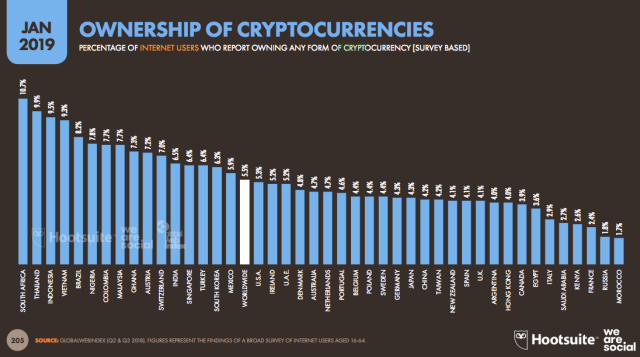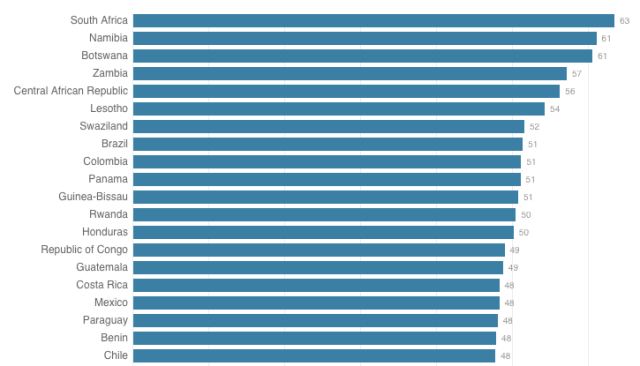According to Hootsuite and We Are Social’s 2019 “Global Digital Yearbook,” South Africa is home to the highest percentage of internet users who say they own cryptocurrency.
Data from the report came from a GlobalWebIndex survey conducted during the second and third quarters of 2018. It points to 10.7 percent of South African internet users owning some form of cryptocurrency. This compares to the worldwide average of 5.5 percent of internet users holding cryptocurrency. The U.S. comes in just below that, at 5.3 percent.
Three Southeast Asian countries follow South Africa’s high. About 10 percent of internet users in Indonesia own crypto, while 9.5 percent of those in Indonesia do, and 9.3 percent do in Vietnam. South Korea is surprisingly low on the list, but still above the global average at 6.3 percent. Japan and China both rank fairly low, with close to four percent of internet users in both countries owning crypto.
Image from Hootsuite and We Are Social's 2019 Global Digital Yearbook

This is the first year social media companies Hootsuite and We Are Social decided to include figures on cryptocurrency ownership in their global digital report. The stats fit in with the report’s coverage of e-commerce statistics, which could become increasingly intertwined with social media as platforms like Instagram start contemplating direct purchasing options. Cryptocurrency tip bots have already appeared on multiple social platforms, further explaining these social media companies’ newfound interest in crypto.
Not all cryptocurrency surveys show South Africa to be a crypto hub. This 2017 Global Cryptocurrency Benchmarking Study from the University of Cambridge, for example, practically ignored the country (Africa and the Middle East together comprised only two percent of its total participants). But that doesn’t mean South Africa isn’t making important strides in crypto. Last month, a local publication announced the establishment of a crypto assets regulatory group in the country. The group plans to lay down uniform tax rules for cryptocurrency.
Google Trends currently shows that searches for the word “bitcoin” are among the highest in South Africa (second only to Nigeria). Meanwhile, bitcoin exchange Paxful has plans to expand on the ground in Southern Africa. The exchange’s transaction volume has increased by 130 percent since January 2018, which CoinDesk reported is largely due to dramatically increased usership in Ghana and Nigeria, which are both ranked above the global average in Hootsuite and We Are Social’s report.
Get the BREAKERMAG newsletter, a weekly roundup of blockchain business and culture.
Perhaps most notably, the World Bank ranked South Africa as the country with the most income inequality in the world last year. On a scale of one to 100, South African got a 63. (For comparison, the U.S. got a 41, same as Haiti, Uganda, Jamaica, and Israel.) Cryptocurrency may be popular in a country with such extreme inequality because it provides a currency for people who don’t have access to traditional banking.
Graph credited to Hilary Fung at NPR

Hootsuite and We Are Social’s Global Digital Report didn’t provide the number of participants for the cryptocurrency ownership survey, only noting that it was a “broad survey of internet users aged 16 to 64” conducted by GlobalWebIndex. GlobalWebIndex collects data in 45 markets across 90 percent of the globe.